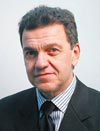
Alumni Newsmakers | '30s | '40s | '50s | '60s | '70s | '80s | '90s | '00s | A Supreme Clerkship | Setting Precedent for Sept. 11 Victims | Making Headlines | Alumnus Named GW Trustee |
An International Veteran | Icing on the Cake | Alumni Bookshelf | In Memoriam
An International Veteran
 Giuseppe Tomasetti, JD ’71, is taking a break in his Milan office on Tuesday afternoon, Sept. 10, 2002. “I don’t think I’ve talked to anyone in the States who hasn’t mentioned Sept. 11 within the first five minutes,” he says.
Giuseppe Tomasetti, JD ’71, is taking a break in his Milan office on Tuesday afternoon, Sept. 10, 2002. “I don’t think I’ve talked to anyone in the States who hasn’t mentioned Sept. 11 within the first five minutes,” he says.
Such is life for Tomasetti, watching events in America unfold from across the Atlantic. Yet, it is this international perspective that has gained him success in the law.
By luck or by fate, Tomasetti’s varied experiences have put him in a series of unique positions. “I feel sort of like the Forrest Gump of the legal profession,” he says. He has worked on both sides of Capitol Hill, has been chief of staff for a governor in Wisconsin, has had his own practice with clients in regulated industries such as energy, telecommunications, and transportation, and has been an equity partner with a large U.S.-based firm. Heading back to Italy in the 1980s, “I came over here for three months, and we never went back.”
Fellow law grads may know him as Joe Thomas. Born in Parma, Italy, he is the son of a physician who moved to the States to research polio. In an effort to Americanize, his father changed the family name to Thomas, and Giuseppe became Joe. When he returned to Italy he went back to using his birth name. “In Italy, your legal identification is always by name and your birthdate, so I really didn’t have a choice.”
Now, at his firm, Milan-based Studio Legal Tributario, part of the Ernst and Young Global Law Alliance, he is the worldwide chairman of the alliance’s mergers and acquisitions committee.
His client base is middle-market traditional manufacturers. Cross-border commercial agreements come up frequently, as companies attempt to position themselves in the global marketplace. His most frequent cases are acquisitions that may require dealing with four or five legal jurisdictions.
“International business law is like playing 3-D chess—once you start doing it, it is pretty hard to go back to checkers. “I recently did a financing with a U.S. bank and companies in California and Melbourne, Australia, involving a revolving credit of $350 million. There was a Chinese lawyer, a German lawyer, an English solicitor, and an American bank. The law part of it was certainly a challenge, but the ‘soft’ things—communication, language skills, knowing history—often dictate success or failure.”
For example, you can’t make references to American sports metaphors, such as baseball. “One time I was a meeting and someone said, ‘We want him to play hardball.’ The Europeans at the table did not have a clue as to what that meant.”
Tomasetti believes GW is an ideal place to study international law. “It’s maybe the only city in the U.S. where you can walk down the street and hear four to five languages in the course of a few blocks.”
The international focus provided by GW has a distinct advantage, he says. “GW gets international, but a lot of schools don’t understand that every domestic legal issue has an international component, and every international issue has a domestic component. Take banking, for example. There are foreign banks directing U.S. financial institutions. Chrysler is being run by a German company. The domestic/international mix is everywhere.”
Because of this intertwining, a change in legal delivery models will need to come about, he says. “The market is changing rapidly and the change is likely to accelerate.”
Four years ago, Tomasetti joined his current firm and began his work in multidisciplinary services. “The concept of multidisciplinary services is very valid in international law work because so much is conditioned upon other disciplines such as tax,” he points out. Nonetheless, he believes a variety of law delivery models are likely to emerge in the coming years.
With three children located around the globe (one in the States, the others in Europe), Tomasetti is leaving more than a legal legacy.
He continues to set the tone for how international business law is handled now and the future. To young attorneys contemplating such a career, he provides some sound advice: “To practice international business law, you need language capacity and need to know history, and you better have a strong constitution. I fly back to the States at least every month and within the EU every week. You have to have a lot of patience for air travel, and the capacity to take a physical and time zone beating. But it is in knowing languages, cultures, geography, and history, coupled with an excellent legal education that really counts.”
—Heather O. Milke